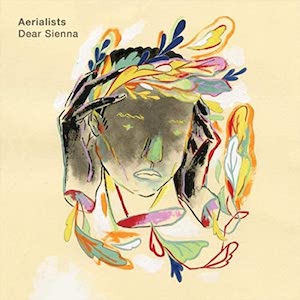 Aerialists – Dear Sienna
Aerialists – Dear Sienna
Fiddlehead Records – Out Now
At least to these ears there are few folk outfits working today as interesting and unpredictable as Aerialists. Actually, in their instance, folk is something of a misnomer, because while folk traditions are at the heart of all they do, this distinctly modern band’s wide-ranging influences, tastes, unusual core instrumentation and tendency to roam within math-y jazz and rock territories in search of a unique sound has them, as I’ve stated here before, successfully occupying a fascinating space all their own. Consequently, the three principal members have used the tag ‘prog-trad’ in an attempt to capture their thing, but now ‘neo-folk’ is the descriptor they seem to have settled upon. It’s certainly a workable term in that it’ll attract curious folkies while giving nothing away about the genre-spanning sound that awaits new listeners.
Following the introductory, eponymous 5-track EP from 2016, Aerialists released the Canadian Folk Music Award/Juno-nominated 2017 album, Group Manoeuvre, and now enter the new decade by presenting Dear Sienna – issued, like its predecessors, on band co-founder Adam Iredale-Gray’s own Fiddlehead Records. And like all that has come before, it’s a masterfully performed collection of intriguing, often haunting material that, to hijack a line from their bio, is “ethereal yet precise, technical yet visceral.”
Berklee College of Music graduate Iredale-Gray is widely known as a fiddle player par excellence, but he contributes that instrument to just two cuts here, his principal Aerialists role being on guitars. Fellow Berklee grads Elise Boeur (fiddle) and Scottish harp maestra Màiri Chaimbeul (sister of Brìghde Chaimbeul) complete the core trio. The three have brilliant accomplices spread far and wide, so on Dear Sienna drum duties are shared by Jake Jenne and Justin Ruppel, while upright and electric basses are handled by Wynston Minckler and Charles James, all of whom are noted session players. It’s a quietly fearsome line-up of talent whose collective skills are on seemingly effortless display here.
At just over a minute a piece, a melancholy original Iredale-Gray melody, The Rope Is The World, bookends Dear Sienna in intro and outro form, as well as appearing at the album’s midpoint, albeit running one minute longer. The opening version showcases Chaimbeul’s glorious harp, while the latter belongs to Boeur, and the pivot rendition sees all three musicians collectively making magic. The opener segues elegantly into a 300-year-old Scottish lament, An Gille Dubh Ciar Dubh (Lad with the Jet Black Hair), a reflective love song sweetly voiced in her native Gaelic by Chaimbeul, yet with rock drums and a sophisticated time signature showing exactly why it can be so difficult to accurately pigeonhole this exploratory band.
The pensive mood is maintained by the following title track, an original Boeur tune, then by Jag Vill (I Want), the music of which was composed by Swedish guest vocalist Isa Holmgren (of Sterna Duo), whose plaintive voice I find most affecting despite not understanding a word of Liv Edor Egenklӧw’s Swedish lyrics. Up next is Que Forte Diamante, a composition by button accordion and clarinet player Williams of the Ontario-based folk duo Emilyn Stam & John David Williams, performed by Aerialists in the style of a Breton An Dro from the BalFolk tradition. That said, with its choppy electric guitar chords its arrangement is leftfield of most anything you’ll have previously encountered from that idiom.
Lesson in the Losing sees Iredale-Gray reunite with former Fish & Bird bandmate, Taylor Ashton, for the third vocal track on Dear Sienna. A full minute intro of a Chaimbeul motif and a brief snaking melody from Boeur give way to Ashton’s soft vocal, then – in another example of Aerialists’ innovative arrangements – Boeur delivers a hypnotic, deeply pretty solo for seventy seconds, before Ashton reenters with another verse to close. It’s a stunner. Comprising the late Island of Mull accordionist Bobby MacLeod’s The Rock on the Clyde and a traditional Irish tune, Paidin Ó Raifeartaigh (Paddy O’Rafferty), the track Jigs is self-explanatory, once more featuring sparkling work from Boeur, but Chaimbeul’s jazzy piano chords again underline Aerialist’s philosophy of cross-pollination.
Before The Rope Is The World (Outro) closes proceedings, the Norwegian traditional tune Raklekjølkin and Orchard follow Jigs. The former is a beautiful piece, yet underpinned by the oddest drum pattern reminiscent of Dirty Three’s Jim White’s inventiveness, while the latter sees Chaimbeul singing English lyrics by Scottish poet Angus Peter Campbell, set against a melancholy melody of her own.
I really enjoy Aerialists’ subtle experiments in mixing it up and, to that end, while still adroitly dabbling with their sound, as an entity Dear Sienna boasts a gentler, more introspective mood than their two previous releases. Offering an intimate world for listeners to explore, the album is well stocked with lovely moments and nicely balanced between instrumental and vocal tracks. And whether whatever Aerialists do is prog-trad, neo-folk or whatever, a presumably deliberate Easter egg in the form of the album’s artwork could help explain their art as the band views it. A painting by Chicago-based artist Lydia Fu, it’s entitled Sympatheia – which just happens to mean “the idea that all things are mutually woven together, and therefore have an affinity for each other.”
http://www.aerialistsmusic.com/
Photo Credit: Jen Squires
